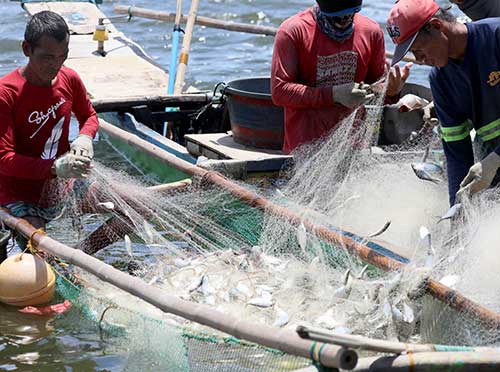
By Francis Allan L. Angelo
International marine protection organization Oceana has warned of a worsening food security crisis and malnutrition among vulnerable coastal communities if commercial fishing is allowed within 15-kilometer municipal waters.
In a statement, Oceana called the 5% decline in the country’s fisheries output in 2024—the lowest in two decades—highly alarming.
The preliminary report from the Philippine Statistics Authority (PSA) showed that marine municipal fisheries production dropped to its lowest since 2002 at 8.8%, from 879.96 thousand metric tons in 2023 to 802.77 thousand metric tons in 2024. This further reduced small-scale fishers’ share in total fisheries production to 19.8%.
Meanwhile, commercial fisheries production increased by 4.2%, reaching 857.33 thousand metric tons in 2024 from 822.43 thousand metric tons in 2023, making up 21.2% of total fisheries production.
Threat to Small-Scale Fishers
Oceana Vice President Atty. Gloria Estenzo Ramos warned that the decline in municipal fisheries output—already at risk due to climate change, habitat degradation, and pollution—could worsen if commercial fishing is legitimized within municipal waters.
“Illegal commercial fishing and overfishing have long plagued Philippine waters, depleting fish stocks and degrading marine ecosystems. These practices threaten biodiversity and can cause the collapse of essential fish populations. If allowed to continue, they will push millions of small-scale fishers into economic hardship and hunger,” Ramos said.
The 1987 Constitution, the Local Government Code, and the Fisheries Code mandate that municipal waters be reserved for artisanal and municipal fishers to protect their food and livelihood security.
However, Oceana pointed out that if the Supreme Court 1st Division resolution and the Malabon Regional Trial Court decision become final, they could open more than 90% of municipal waters in 533 out of 884 coastal municipalities to commercial fishing vessels.
“Allowing large commercial operators with advanced equipment into these reserved zones will unfairly disadvantage small fishers and threaten their daily catch, which sustains their families and local markets,” Ramos added.
Growing Opposition
Religious leaders, lawmakers, and local government officials have strongly opposed the controversial court rulings.
Over the weekend, 50 bishops from the Catholic Business Conference of the Philippines (CBCP), led by Cardinal Pablo Virgilio David of the Diocese of Kalookan, issued a pastoral statement condemning the decisions.
Local government executives have also expressed concerns, with some pledging to uphold their mandate to protect and manage their municipal waters to ensure food and livelihood security for their constituents.
At the House of Representatives, Cagayan de Oro Rep. Rufus Rodriguez and Kabataan Party-list Rep. Raoul Manuel joined the growing opposition, warning of the threat to marine biodiversity and the potential food security crisis.
Rodriguez has since filed a bill seeking to reserve municipal waters exclusively for small-scale fishers. Meanwhile, Kabataan, GABRIELA, and ACT Teachers Party-list groups filed House Resolution 2202, directing the Committee on Aquaculture and Fisheries Resources to investigate the Supreme Court resolution’s impact.
Strict Enforcement
Ramos emphasized the need to fully enforce existing fisheries management laws and maintain reforms aimed at protecting marine resources.
“Science-based solutions, including vessel monitoring measures and the Fisheries Management Areas system, have given artisanal fishers hope that their livelihood and food security can be preserved. We must enforce the law to prevent commercial fishing operators from exploiting marine resources for profit at the expense of small-scale fishers,” she said.






















